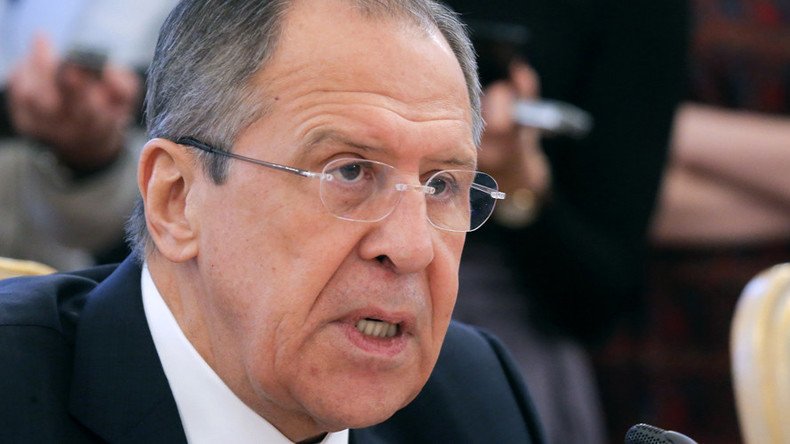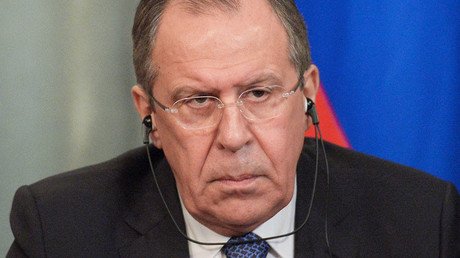Meddling with sovereign states' internal affairs leads to chaos, power vacuums & terrorism – Lavrov

Any unilateral interference in internal affairs of sovereign states inevitably leads to chaos and power vacuum that breeds radical extremism, said Russian FM Sergey Lavrov, emphasizing mutual respect for international law as important stabilizing factor in global politics.
“Interference in the internal affairs of sovereign states, and attempts to force them to adopt problem-solving recipes based on some alien patterns seriously undermine the stability of the international system, sometimes leading to chaos, creating a vacuum that is quickly filled by extremists, terrorists, as we are witnessing in the Middle East and Northern Africa,” the Russian Foreign Minister said in an interview with journalists from Mongolia, Japan and PRK.
Speaking of the turbulence which is currently observed in international affairs, Lavrov noted the importance of strategic partnership, specifically with BRICS, Eurasian Economic Union and Shanghai Cooperation Organisation countries, outlining the direction for this partnership to be one of respect for the foundations of international law, which in his words will prove to be “an important stabilizing factor” for the global politics.
No illusions: Shift to multipolar world presents new challenges for all global powers – Lavrov https://t.co/OQOETd3D7F
— RT (@RT_com) April 10, 2016
In this context, Lavrov noted the significance of the ministerial meeting between Russia, India and China set for next week. He stressed, that this ‘trio’ provided the initial impetus for the creation of BRICS (an acronym standing for the association of five major emerging national economies: Brazil, Russia, India, China and South Africa), which became a “format that marked the beginning of a very important process in world politics.”
The cooperation between Russia, India and China has very good prospects, and, Lavrov pointed out, could become especially efficient in improving the chilly bilateral relations between India and China, which date back to border disputes of the 1960s.
The three sides also plan to discuss the approaching reform within the UN, especially the reformation of the UN Security Council, Lavrov added. He however stressed that all three states advocate exclusively those decisions, which are supported by the “broadest possible consensus” to avoid any “rift within the organization.”
‘Russia, China reject N.Korean nuclear ambitions, recognize legitimate security concerns’
The Minister expressed concern about the situation on the Korean Peninsula, which is to be further discussed during the meetings with his Chinese counterpart. He stressed that both Russia and China consider the nuclear ambitions of North Korea inappropriate.
“We recognize the legitimate concerns of [North Korea] about their own security, but reject its claim to maintain a nuclear status and oppose the nuclear proliferation philosophy advocated almost openly [by Pyongyang]. It contradicts not only the views of Russia and China, but also the positions of all parties to the Treaty on the Non-Proliferation of Nuclear Weapons.”
BREAKING: N.Korean nuclear issue should not be pretext for US to deploy air defenses– Lavrov https://t.co/SYicdW7Gdjpic.twitter.com/FzciOHO9w8
— RT (@RT_com) March 11, 2016
However Russian and China are equally worried by the actions “on the other side of the conflict,” Lavrov emphasized, referring to plans to deploy an anti-missile systems in the Republic of Korea as part of a new US missile defense position area in Northeast Asia. Lavrov noted that both Russia and China oppose the “desire of individual states to use the difficult situation on the Korean Peninsula to build up its military presence in the region,” stressing that “it is completely disproportionate” to the real scale of the threat.
“Together with our Chinese friends we understand that this course will create a real threat to the security of our countries by breaching the strategic stability,” the Russian minister noted.
‘Relations with Japan intrinsically valuable, have strong potential’
Concerning the “intrinsically valuable” relations with Japan, the Minister pointed out that their potential is strong despite their current state, worsened by sanctions against Russia.
Lavrov however noted that the fact that Japan joined Europe and the US in imposing sanctions on Russia in the wake of the conflict in Eastern Ukraine could be due to Japan not being entirely independent when it comes to decision-making.
“We are well aware that, unfortunately, Japan is not the only country that is not entirely independent in its foreign policy actions. Of course, we would like to see such a large and powerful country like Japan to have more weight in international affairs […] We are convinced that unilateral sanctions are absolutely illegal. The only way to legitimately impose sanctions is through the UN Security Council.”
The Minister also called unethical the notion of disapproval by Washington of high-level contacts between Russian and Japanese leaders.
“We have heard statements from Washington that they do not approve high-level contacts between Russia and Japan. Such behavior is outrageous. I believe that our Japanese colleagues understand it and treat such manners with as much resentment as they deserve.”
‘The Arctic: a place for dialogue and cooperation’
Lavrov spoke much about plans for developing the Arctic, which is “becoming more and more open,” and predicted significant growth of navigation along the Northern Sea Route.
“Enhancing the use of the Northern Sea Route is taking place because the Russian Federation is taking the necessary steps to ensure that [the route] is convenient and comfortable. It is increasingly popular. I think that in the future it will become a rather useful, effective way to transport goods between Europe and Asia.”
“We are interested in the Arctic to become a territory of dialogue and cooperation,” Lavrov said, adding that Russia has a special responsibility to ensure not only the efficiency, but also the safety of the Arctic route located along Russia’s borders.













